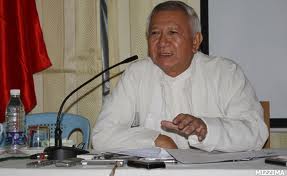(Translation of Weekly Eleven Media Group’s Article published on 2012 March 14.)
According to the reliable information we’d received, from the experts familiar with the Union Central Bank about the ongoing matter of consolidating and transforming the current various exchange rates into single exchange rate, the official exchange rate for Kyat will be floated as per the prevailing market rate from coming 2012-13 Fiscal Year and the foreign currency expenditures in the Government’s budget and for the various ministries will be converted from Kyat at the fixed rate of 800 Kyats per US$.
“What I know so far is from First April the Kyat will be floated and all Government expenditures will be calculated with 800 Kyats a US Dollar rate. So all the laws and regulations and procedures required are to be done before that date,” said Professor Maw Than the retried rector of Institute of Economics and a member of the advisory committee to the Union Ministry of Commerce and Revenue.
Chief Presidential Economic Advisor U Myint also said, “One Vice-President of the Union Central Bank told us at a meeting that the transformation (of Exchange Rate) would begin from the First April. That decision is Union Bank’s solely and we don’t get involved and I don’t want to comment.”
 |
| Dr. U Myint. |
“The exchange rate matter is solely a decision by the Union Central Bank. We cannot decide the matter. So far there is no official announcement yet. But it is a must to do. And important is they have to do it and handle it right way. It’s not a matter to rush through. They also need the agreements from international organizations like IMF. If the rate is to be a floating rate they need to meet up with IMF soon, possibly in this month.”
According to the experts familiar with the matter the new exchange rate will be a managed-float as the Union Central Bank will be intervening in the currency market from time to time if required. There will strictly be only one exchange rate as other various existing rates such as FEC rate and Export-Earning rate will also be abolished.
U Myint the chief economic advisor to the president has concluded in his research paper that two things are essential to reform Myanmar’s exchange rate system and to bring it in line with regional and international practice. First is to unify the multiple exchange rates that now exist in Myanmar and second is to remove and liberalize the restrictions that now exist in the current account transactions of the country’s balance of payments.
U Myint also concluded in his paper submitted in last year National Workshop for Economic Development and Reform that undertaking both the above measures will go much beyond matters related to the exchange rate. It will involve making a serious effort at long overdue macroeconomic reforms. This will be a slow and arduous process. A soft landing is not in sight. However, it is hoped the kyat exchange rate problem which the country is experiencing at present, will serve as a wake-up call, and which also provides the political will to start the macroeconomic reform process without further delay.
 |
| Professor Dr. Joseph Stiglitz. |
"The government is clearly well aware of the natural-resource curse and Myanmar's government is making progress toward simplifying its unwieldy foreign exchange regime and is seriously pursuing other major reforms," he added.
The official government exchange rate has long been kept at about six Myanmar kyat for every U.S. dollar, compared with roughly 800 kyat per dollar in public markets—a massive gap that introduced a range of distortions to the economy and made it dramatically more complicated to do business there.
Analysts have said the system allowed government officials and state-owned enterprises to in essence maintain two sets of books, potentially making it easier to hide revenue that could be diverted to other needs, such as military hardware. Government officials have denied that.
Another reason for having multiple exchange rates, economists say, is that it can give a government more control over the local economy and help subdue inflation, at least in the short term.
Myanmar's leaders have asked the International Monetary Fund for technical assistance in unifying the rates.
Mr. Stiglitz said he was told during his trip that the government was already doing some of its bookkeeping at the unofficial rate, indicating it is already moving toward accepting market levels for kyat, though he stressed this was not confirmed to him by government officials. The government has also licensed some private banks to conduct currency exchange.
In meetings with officials, he said, "They made it very clear that they are headed for foreign-exchange-rate unification," and it appeared the issue was "being dealt with fairly quickly," he said.
 |
| Dr. Stiglitz at WEF. |
Burma has been working together with International organizations such as IMF and ADB and World Bank to implement various economic reforms including the transformation currency exchange rate.
IMF has recently concluded that transforming various exchange rates into one rate is the most important policy matter for Burma, and Burmese economy can possibly grow at least 6% in coming 2012-13 fiscal year and Burma could easily become a future economic tiger of Asia.
***********************************

